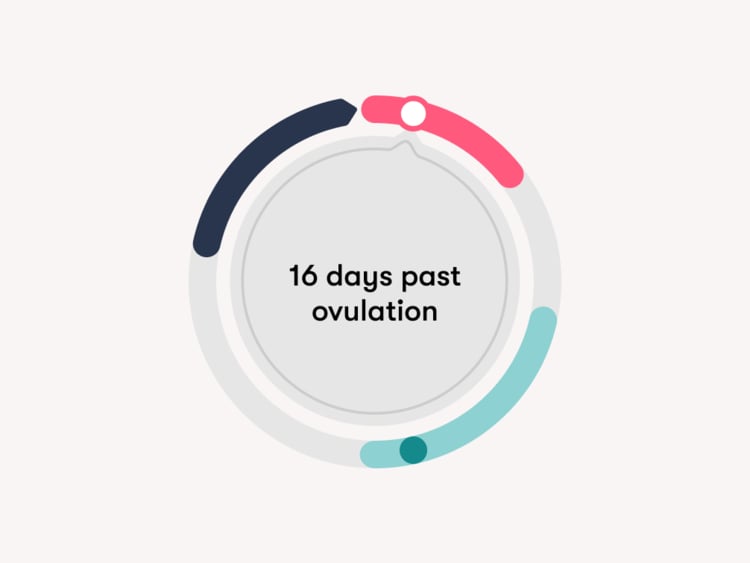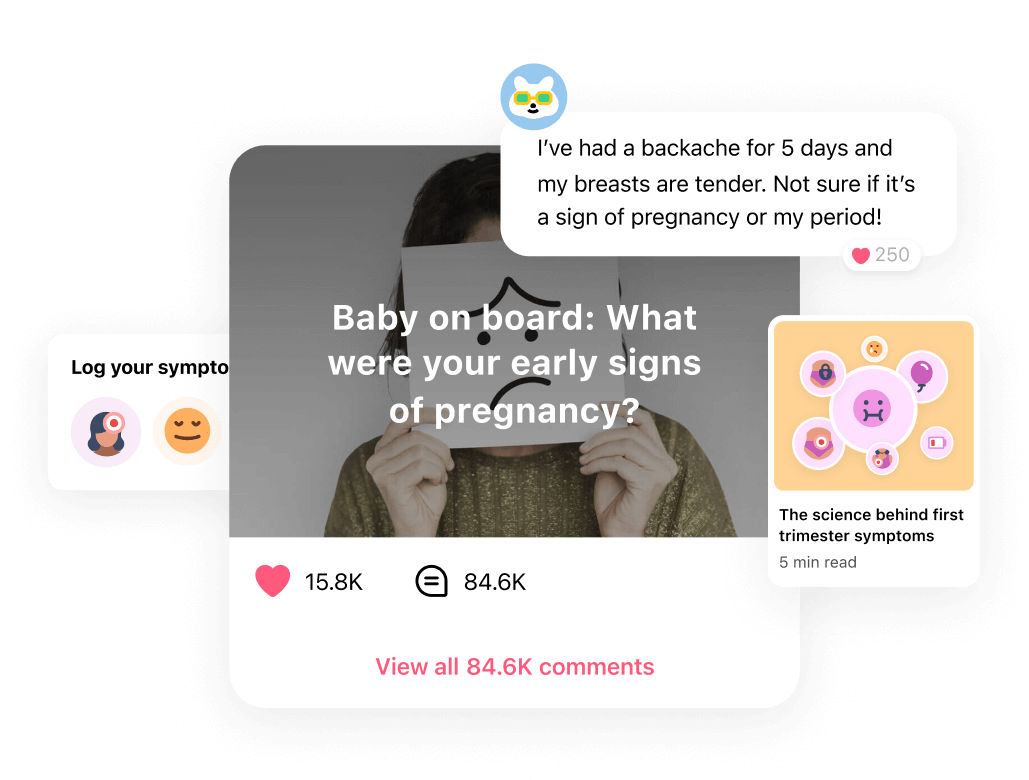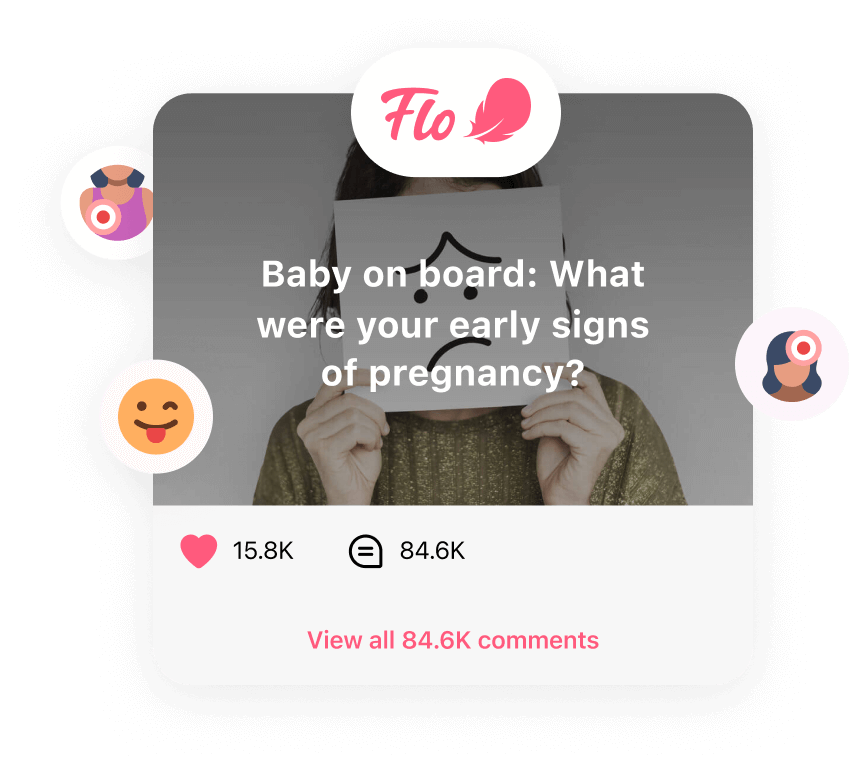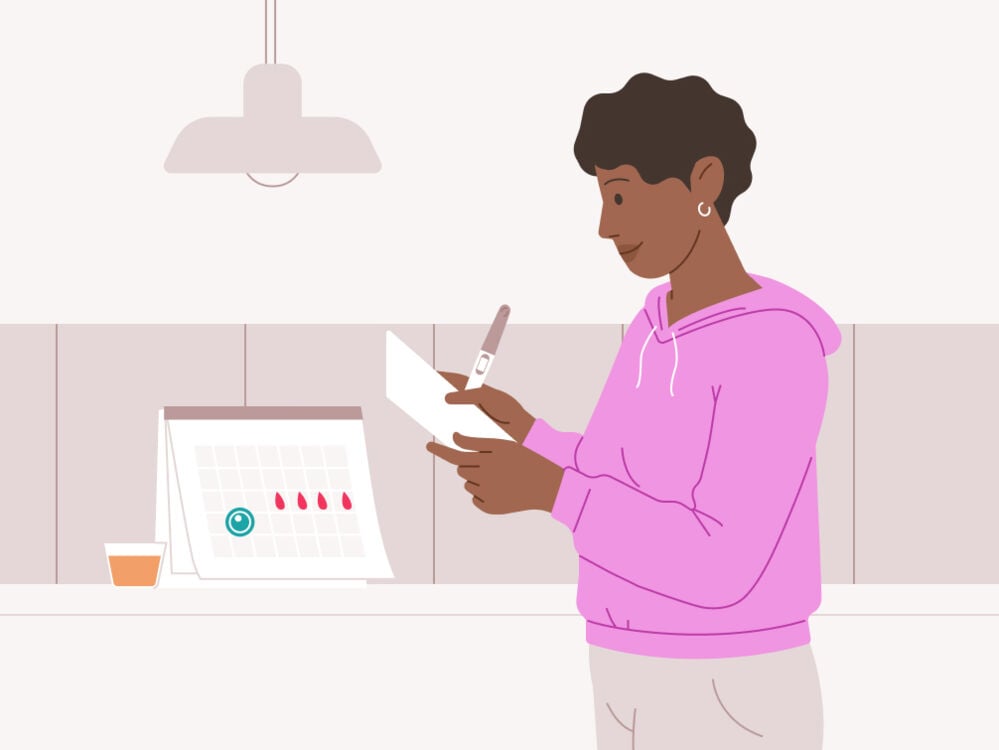It’s normal to look for signs that you’re pregnant, but is it too early to tell? Here’s the lowdown on 16 DPO, including whether you can take a test.
-
Tracking cycle
-
Getting pregnant
-
Pregnancy
-
Help Center
-
Flo for Partners
-
Anonymous Mode
-
Flo app reviews
-
Flo Premium New
-
Secret Chats New
-
Symptom Checker New
-
Your cycle
-
Health 360°
-
Getting pregnant
-
Pregnancy
-
Being a mom
-
LGBTQ+
-
Quizzes
-
Ovulation calculator
-
hCG calculator
-
Pregnancy test calculator
-
Menstrual cycle calculator
-
Period calculator
-
Implantation calculator
-
Pregnancy weeks to months calculator
-
Pregnancy due date calculator
-
IVF and FET due date calculator
-
Due date calculator by ultrasound
-
Medical Affairs
-
Science & Research
-
Pass It On Project New
-
Privacy Portal
-
Press Center
-
Flo Accuracy
-
Careers
-
Contact Us
16 DPO: Can you take a pregnancy test at 16 days past ovulation?


Every piece of content at Flo Health adheres to the highest editorial standards for language, style, and medical accuracy. To learn what we do to deliver the best health and lifestyle insights to you, check out our content review principles.
When you’re trying for a baby, waiting to take a pregnancy test can feel never-ending. But it’s important to give your body time to produce enough of the pregnancy hormone human chorionic gonadotropin (hCG), because this is what at-home pregnancy tests look for in your urine. Test too soon, and you might get the wrong result.
If you’re currently 16 days past ovulation (DPO), and your period hasn’t started yet, you might have mixed feelings. Missing a period is one potential sign that you might be pregnant, but the only way to know for sure is by taking a test. And depending on your cycle length, 16 DPO may still be a little bit too early.
So here’s the lowdown on 16 DPO, from the symptoms you might be feeling to how to boost your chances of an accurate pregnancy test result.
Key takeaways
- Most experts recommend waiting until at least the first day of your missed period before you take a pregnancy test. This can look slightly different for everyone, as your cycle length is personal to you. You may be able to take a pregnancy test from around 14 DPO.
- Your body starts to release the pregnancy hormone hCG after your fertilized egg implants into the lining of your uterus. While your hCG levels start low, they rapidly rise, and by 16 DPO, yours may be high enough to detect with a test.
- Experts recommend waiting to take a test until you’ve missed your period, because if you test too early, you run the risk of getting a false negative.

 Over
7.8M
ratings averaging
4.8/5
*
Over
7.8M
ratings averaging
4.8/5
*
Understand your body’s signals with the Flo app
- Chat with others who are trying to get pregnant.
- Get trusted information on signs of pregnancy from 100+ medical experts.
- Log your symptoms and learn what they could be trying to tell you.
 Over
7.8M
ratings averaging
4.8/5
*
Over
7.8M
ratings averaging
4.8/5
*

Trying to conceive?
The Flo app can help you through the two-week wait.

 Over
7.8M
ratings averaging
4.8/5
*
Over
7.8M
ratings averaging
4.8/5
*
Understand your body’s signals with the Flo app
- Chat with others who are trying to get pregnant.
- Get trusted information on signs of pregnancy from 100+ medical experts.
- Log your symptoms and learn what they could be trying to tell you.
16 DPO: What to expect
If you’re curious what DPO or “days past ovulation” means, know that it’s simply that 16 days ago, one of your ovaries released an egg in order for it to be fertilized by a sperm. To understand why this is important, it can be helpful to break down your cycle into two stages:
- The follicular phase: The first part of your cycle is called your follicular phase. This phase runs from the first day of a new period to around the midpoint in your cycle. Your cycle length is really personal to you, but anything between 21 and 35 days is considered typical. During your follicular phase, one of your ovaries will prepare an egg for release during ovulation. Your estrogen levels rise, and the lining of your uterus thickens.
- The luteal phase: The second phase of your cycle is called your luteal phase. This starts from the day you ovulate. Your progesterone levels will rise to support a potential pregnancy and — if you conceive — your fertilized egg may implant into the lining of your uterus. This is implantation and marks the official start of pregnancy.
It can take six to 10 days for your fertilized egg to travel down your uterine tubes and for implantation to happen. This means that you can be considered pregnant from around 6 to 10 DPO. By 16 DPO, you may have been pregnant for over a week.
After implantation, your placenta starts to develop. This is a whole new organ that your body grows to support your pregnancy. It’s the placenta that produces hCG, the pregnancy hormone that at-home tests detect in your urine.
“HCG is detectable in the blood about six to 11 days after conception, but it takes slightly longer to appear on at-home pregnancy tests that measure hCG in urine,” says Dr. Nazaneen Homaifar, obstetrician and gynecologist, Inova Health System, Washington, DC, US. “Rising hCG levels are also responsible for some of the early pregnancy symptoms.”
So, if your hCG levels have started to rise, can you take a pregnancy test at 16 DPO and get an accurate result?
Can I take a pregnancy test at 16 DPO, or is it too early?
Generally, 14 DPO is the earliest point you can do a pregnancy test. When you’re figuring out the right time for you to take a pregnancy test, the key is to know how long your cycles typically are. You can easily figure this out using a period calculator or a period-tracking app like Flo.
Alternatively, you can note the dates between your last two periods to get a rough idea. The total number of days between those two dates is the number of days in your cycle. If you do this for three months, you’ll be able to determine the average length of your cycle. You may notice that your cycles aren’t exactly the same from month to month. Slight variations in the number of days between your periods are fairly typical.
If you have an irregular cycle, then you might still not have missed a period yet at 16 DPO. Waiting to take a test can be frustrating, but it’s important to wait until your body has enough time to produce hCG to be detected.
How to take a pregnancy test
If you’ve missed a period, then it can be handy to understand how to take a test to get an accurate result. This can feel like a little bit of pressure, but be reassured that provided you use them at the right time and exactly as instructed, most home pregnancy tests are 99% accurate. Here are some things to consider:
- Think about where you would like to do your test. While it’s important that you wait at least until the first day of your missed period, where you do a pregnancy test is entirely up to you. It’s normal to feel nervous before doing a test, so think about the place you’re most comfortable. This could be at home, at your partner's home, or a friend's house.
- Ask yourself if you’d rather do the test by yourself or with a loved one. Would you want to do it by yourself or with someone else? Who will you tell about the result?
- Take a moment to read the directions that come with the test and follow every step exactly. While peeing on a stick sounds like a pretty basic task, there’s no rush. Make sure you feel confident in what you’re doing beforehand.
- Don’t forget to check the expiration date on the box. Did you know that pregnancy tests can expire, and this can affect the results?
- Figure out what negative and positive results look like. A positive result may show as a plus sign, a line, or the word “pregnant,” depending on the brand and type of test. Get familiar with what yours might look like.
- “Take the test right after you get up in the morning. That’s when your urine is the most concentrated, making hCG easier to detect,” says Dr. Homaifar. She also explains that you don’t need to drink lots of fluids beforehand. This can actually dilute your hCG levels.

Understanding your pregnancy test results
If you’ve been trying to conceive, getting a positive pregnancy test at 16 DPO can be a really exciting time.
However, having a baby changes your life in many ways, so give yourself a moment to let the news settle in a little bit. You can then reach out to your health care provider. They will be able to outline what your best next step is and talk you through what your prenatal appointments may involve.
If you can only see a faint line on your pregnancy test and aren’t sure if this means you’re expecting, then try not to worry. Wait for a few days and then test again. A faint line on a pregnancy test can mean a few different things:
- You’re very early on in your pregnancy.
- Your urine was too diluted.
If the line appears stronger after the second test — or you are still unsure of your result — reach out to your health care provider.
Similarly, if you get a negative pregnancy test result at 16 DPO, then consider doing another test in a few days. “Depending on how long your menstrual cycle is, or if you have irregular cycles and therefore ovulated later, you may still be pregnant but not able to detect the pregnancy so early on,” says Dr. Homaifar.
“If you get a negative test result, but you still think you might be pregnant, take another test one week after your missed period or contact your health care provider, and make sure you didn’t check the test results too soon,” she adds.
Pregnancy symptoms at 16 DPO
If you feel slightly different at 16 DPO, then you might be curious if it could be an early sign of pregnancy or a premenstrual symptom. These are sometimes described as premenstrual syndrome (PMS) symptoms.
It can be hard to tell the difference between PMS and early pregnancy symptoms, as they can feel similar and arrive at a similar time. So here’s the lowdown on what you might be feeling at 16 DPO and why.
A missed period
The first telltale sign that a baby is on the way is often a missed period. So, if you’re 16 DPO, and your period hasn’t started yet, now would be a good time to take a pregnancy test. Pregnancy isn’t the only reason your period might be late or not come at all, but it’s best to do a test to be sure.
Fatigue
If you feel like you’re falling asleep at your work desk at 16 DPO, then it could be linked to your cycle. Fatigue is pretty common at the end of your luteal phase as your progesterone levels fluctuate. However, feeling more tired than normal could also be a sign of early pregnancy. Confusing, right?
Nausea
Feeling nauseous is always unpleasant. It might not be the first thing you think of when you hear about premenstrual symptoms, but it turns out that period nausea is fairly common as your hormones fluctuate. Similarly, nausea, also known as morning sickness or pregnancy sickness, is a well-known early sign of pregnancy. This could be thanks to a surge in pregnancy hormones like hCG, which your body begins to produce after implantation.
Breast pain
Breast pain is a normal part of PMS. As your hormone levels fluctuate at the end of your luteal phase, your boobs might feel swollen or heavy. You guessed it though: Breast changes can also be an early pregnancy sign. Generally speaking, breast sensitivity can start anywhere from a few days to one to two weeks after conception. The area around your nipple might also begin to darken and get bigger.
Take a quiz
Find out what you can do with our Health Assistant
Frequent urination
There are lots of different reasons you might need to pee more than normal. From drinking too much fluid, drinking more caffeine, or — if it’s accompanied by symptoms like burning and a funny smell — you might have a urinary tract infection (UTI). Luckily, UTIs are easily treated, so speak to your health care provider.
If you feel the need to pee more than usual at 16 DPO, pregnancy hormones could also be to blame. During early pregnancy, your blood supply increases, and your kidneys need to work overtime to remove the extra waste, leading to an increased need to pee. Similarly, as your hormones fluctuate, your pelvic floor muscles that hold your bladder in place can loosen, and as your progesterone levels rise, these muscles can become more flexible.
Mood swings
Thanks again to fluctuations in your estrogen and progesterone levels, you might experience mood changes at 16 DPO as you wait for your period to arrive. It’s totally normal to feel more irritated than usual at this time. Alternatively, you might feel these PMS-like mood changes at the start of pregnancy.
16 DPO and no symptoms
If you haven’t felt any symptoms at 16 DPO, you may be curious if this means you’re not pregnant. This isn’t necessarily the case. Everyone experiences pregnancy differently. In fact, some people don’t have any symptoms for several weeks into their pregnancy.
At 16 DPO, it’s still very early into a potential pregnancy, so it’s normal if you don’t feel anything at all. “I generally tell patients that pregnancy symptoms can start as soon as four to six weeks but may not be very strong until a little later,” says Dr. Homaifar.
More FAQs
What are the symptoms of hCG rising?
Your body will start releasing the pregnancy hormone hCG after implantation. From that point, your hCG levels may rise rapidly, and your hormone levels can change monumentally. These changes have been linked to missing periods, nausea, increased need to pee, and sore boobs.
Is a urine test negative at 16 DPO?
It is possible to get a negative at-home urinary pregnancy test at 16 DPO. Pregnancy tests detect hCG in your urine. If you don’t wait until the first day of your missed period, then you run the risk of getting a false negative. If the first day of your missed period has passed, and you’re still getting a negative result, try to wait a few days and test again.
Can you get a false negative at 16 DPO?
It is possible to get a false negative at 16 DPO. If you tested negative, but your period still hasn’t started, depending on the length of your menstrual cycle, you may still be pregnant. Home pregnancy tests can only detect hCG at certain levels, so try testing again.


Hey, I'm Anique
I started using Flo app to track my period and ovulation because we wanted to have a baby.


The Flo app helped me learn about my body and spot ovulation signs during our conception journey.


I vividly
remember the day
that we switched
Flo into
Pregnancy Mode — it was
such a special
moment.
Real stories, real results
Learn how the Flo app became an amazing cheerleader for us on our conception journey.
References
“Am I Pregnant?” Cleveland Clinic, my.clevelandclinic.org/health/articles/9709-pregnancy-am-i-pregnant. Accessed 16 Nov. 2023.
Betz, Danielle, and Kathleen Fane. “Human Chorionic Gonadotropin.” StatPearls. StatPearls Publishing, 14 Aug. 2023, www.ncbi.nlm.nih.gov/books/NBK532950/.
Bunce, Emily E., and Robert P. Heine. “Nausea and Vomiting during Early Pregnancy.” MSD Manual Consumer Version, July 2023, www.msdmanuals.com/home/women-s-health-issues/symptoms-during-pregnancy/nausea-and-vomiting-during-early-pregnancy.
“Common Health Problems in Pregnancy.” NHS, www.nhs.uk/pregnancy/related-conditions/common-symptoms/common-health-problems/. Accessed 18 Dec. 2023.
“Doing a Pregnancy Test.” NHS, www.nhs.uk/pregnancy/trying-for-a-baby/doing-a-pregnancy-test/. Accessed 18 Dec. 2023.
“First Trimester Fatigue.” Johns Hopkins Medicine, www.hopkinsmedicine.org/health/conditions-and-diseases/first-trimester-fatigue. Accessed 18 Dec. 2023.
“Follicular Phase.” Cleveland Clinic, my.clevelandclinic.org/health/body/23953-follicular-phase. Accessed 18 Dec. 2023.
“Frequent Urination.” Mayo Clinic, 19 May 2023, www.mayoclinic.org/symptoms/frequent-urination/basics/causes/sym-20050712.
Gudipally, Pratyusha R., and Gyanendra K. Sharma. “Premenstrual Syndrome.” StatPearls. StatPearls Publishing, 17 July 2023, www.ncbi.nlm.nih.gov/books/NBK560698/.
“Home Pregnancy Tests: Can You Trust the Results?” Mayo Clinic, 23 Dec. 2022, www.mayoclinic.org/healthy-lifestyle/getting-pregnant/in-depth/home-pregnancy-tests/art-20047940.
“Pregnancy and Bladder Control.” Cleveland Clinic, my.clevelandclinic.org/health/diseases/16094-pregnancy-and-bladder-control. Accessed 18 Dec. 2023.
Keye, William R., Jr. “Premenstrual Syndrome (PMS).” Encyclopedia of Endocrine Diseases, Elsevier, 2004, pp. 73–75.
“Luteal Phase.” Cleveland Clinic, my.clevelandclinic.org/health/articles/24417-luteal-phase. Accessed 18 Dec. 2023.
“Menstrual Cycle: What’s Normal, What’s Not.” Mayo Clinic, 22 Apr. 2023, www.mayoclinic.org/healthy-lifestyle/womens-health/in-depth/menstrual-cycle/art-20047186.
“Missed or Late Periods.” NHS, www.nhs.uk/conditions/missed-or-late-periods/. Accessed 18 Dec. 2023.
“Ovulation Calendar: What It Is and How to Use It.” Cleveland Clinic, 15 Oct. 2021, health.clevelandclinic.org/ovulation-calendar.
“Placenta.” Cleveland Clinic, my.clevelandclinic.org/health/body/22337-placenta. Accessed 18 Dec. 2023.
“Pregnancy Test.” MedlinePlus, medlineplus.gov/ency/article/003432.htm. Accessed 18 Dec. 2023.
“Progesterone.” Cleveland Clinic, my.clevelandclinic.org/health/body/24562-progesterone. Accessed 18 Dec. 2023.
Su, Ren-Wei, and Asgerally T. Fazleabas. “Implantation and Establishment of Pregnancy in Human and Nonhuman Primates.” Advances in Anatomy, Embryology, and Cell Biology, vol. 216, 2015, pp. 189–213, https://doi.org/10.1007%2F978-3-319-15856-3_10.
Thiyagarajan, Dhanalakshmi K., et al. “Physiology, Menstrual Cycle.” StatPearls. StatPearls Publishing, 24 Oct. 2022, www.ncbi.nlm.nih.gov/books/NBK500020/.
“Urinary Tract Infections (UTIs).” The American College of Obstetricians and Gynecologists, Jan. 2023, www.acog.org/womens-health/faqs/urinary-tract-infections.
“Week 4.” NHS, www.nhs.uk/start-for-life/pregnancy/week-by-week-guide-to-pregnancy/1st-trimester/week-4/. Accessed 18 Dec. 2023.
“What Are Some Common Signs of Pregnancy?” Eunice Kennedy Shriver National Institute of Child Health and Human Development, www.nichd.nih.gov/health/topics/pregnancy/conditioninfo/signs. Accessed 18 Dec. 2023.
Zou, Yuliang, et al. “Hormonal Changes and Somatopsychologic Manifestations in the First Trimester of Pregnancy and Post Partum.” International Journal of Gynaecology and Obstetrics, vol. 105, no. 1, Apr. 2009, pp. 46–49, doi.org/10.1016/j.ijgo.2008.12.001.
History of updates
Current version (19 December 2023)
Published (17 June 2019)
In this article

Get your personal guide to fertility
-
Learn how to read your body's ovulation signals
-
Find daily conception tips from our experts
-
Chat with others who are trying to get pregnant




